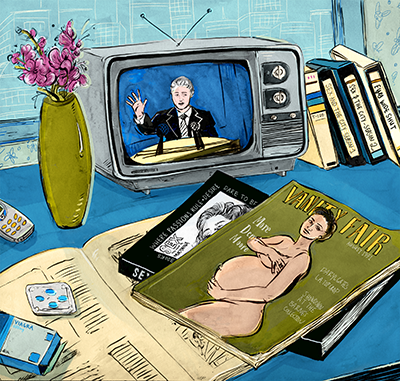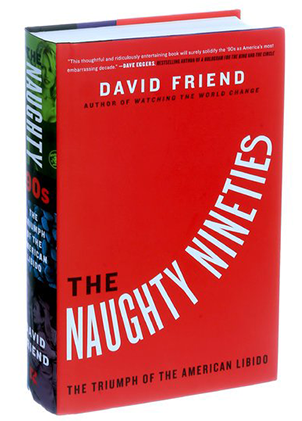
I recall my surprise, sometime in the late 1990s, when a schoolteacher colleague of my wife’s mentioned a sex-toy club she had joined, a kind of Tupperware group that met monthly to share ideas and products. Such matter-of-factness about long-taboo subjects, it turns out, was the hallmark of the United States in the 1990s—or so says Vanity Fair editor David Friend ’77 in his aptly named new book.
Its thesis is that the decade’s preoccupation with sex—from scandals, to sexual enhancements of all kinds, to the pornification of daily life—“laid the groundwork for our current age,” as Americans, ensconced “in a giddy interregnum of narcissism, solipsism, and skyrocketing mutual funds,” took their erotic obsessions public. Naughtiness, Friend holds, became the dominant mode of fin-de-siècle American life.
The Naughty Nineties is nothing if not ambitious, moving from anthropological analysis of Sex and the City bus tours, to the hermeneutics of the Demi Moore pregnancy photo, to the politics of “Don’t Ask, Don’t Tell,” to the ordeal of the Anita Hill/Clarence Thomas hearings. The book is well-stocked with pithy insights—“Celebrity schadenfreude was becoming a national pastime”—and indelible quotations, like that from a breast-implant surgeon who comments that “Houston is a very overaugmented city.”
An excellent chapter on the R&D of Viagra is both informative and witty.
An excellent chapter on the R&D of Viagra is both informative and witty, noting that the work took place in a Pfizer lab near
Canterbury, England, “practically the birthplace of the ribald tale.”
Friend offers reportage too, doggedly tracking down and interviewing such forgotten figures of ’90s notoriety as Lorena Bobbitt and Heidi Fleiss. Participatory journalism acquires a whole new allure when the subject is, for instance, bikini waxing, but our author forays intrepidly into the arena. The pièce de résistance is his excursion to a therapy center in San Francisco, where he joins an audience observing a session of OM: orgasmic meditation.
Throughout this naughty book, the author’s incorrigible punning—calling urologists at an erectile-dysfunction seminar “peers in the penile colony,” to take one of many examples—challenges a reviewer to double down on his own saucy innuendo. Can I praise Friend’s penetrating insights into American popular culture, or his blow-by-blow description of the Lewinsky scandal?

